On this winter Saturday morning in Adelaide, we are witnessing terrible weather filled with rain, rain, storms, lightning, and winds of 100 km/hr. Two weeks ago, Adelaide Airport was closed for hours, but I don't remember this happening in my (sadly, relentless) travel history. Another sign I suspect, climate change, and as we know, a slow, gloomy, and seemingly inevitable march towards a vibrant climate. And to divert myself from such pathological thoughts, I want to write. Or, to deal with such pathological thoughts, I like to write.
A few weeks ago, I wrote about how four days could be a long time for business. Furthermore, this week alone, I was trying to persuade my friends at Tribe Global Ventures to wrap up the excellent podcast on startups and technology for 2023 (full disclosure, I helped them start the podcast, but they are doing their amazing thing now). Just to understand that I am a slacker and outsourcing content production, I wanted to consume it myself. Be the change you want to see in the world, Rainey.
It has been a year.
After a few years (which I think we can all agree were very strange), 2023 has proven to be the year of the saying, "After extreme shock systems return to average - the most likely for reasons other than results." For years, we claimed that our way of working would change forever, yet in reality, 90% of companies plan to implement work-from-work policies by the end of 2024. As far as economic indicators go, the stock market has shown a reproducible trend of recovering and reverting to average post-Covid (see the chart below from Fidelity). WHO reports that our health system has nearly recovered to pre-pandemic levels, and even our national well-being has returned to pre-pandemic levels, as measured by NAB.
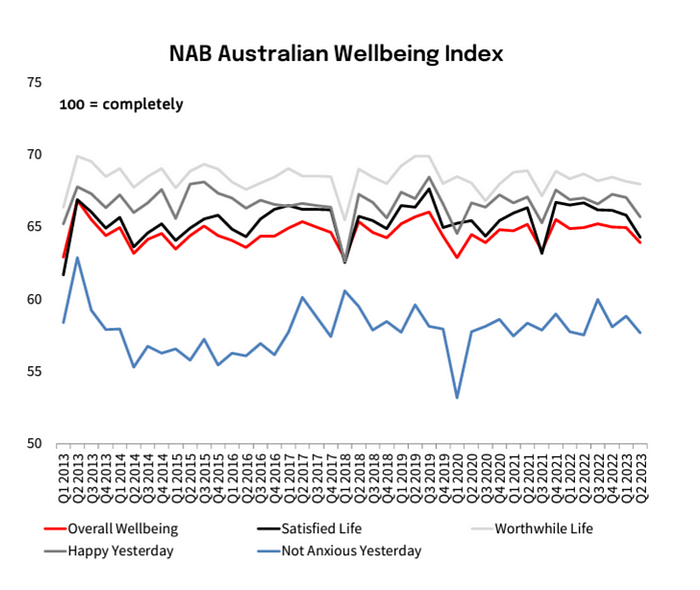
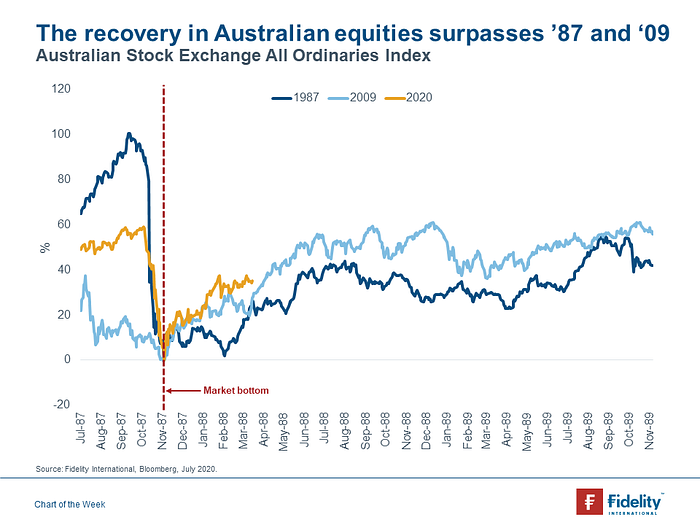
Given all this, why is there less of a "deep sigh of relief" atmosphere in 2023 and more of a "screaming on TV" atmosphere?
It is uncertainty, I think.
Rationally, looking at this data should be enough to calm your inner Taylor Swift and "need to chill." However, in reality, I think the uncertainty of the past few years has triggered a PTSD response. Therefore, even if the threat is gone, it can feel very real.
It has been a tough year. People got sick, they were isolated from loved ones for a long time, loved ones passed away, and we couldn't attend their funerals, people lost jobs and livelihoods, and we had multiple ongoing wars. Despite being very far from these wars, as an immigrant nation, it means that most people were affected in personal ways by them. There have been many losses. And even if the world has returned to normal in many other ways, it is hard to be too bright about it.
So in 2023, I think we are all still very tense. On edge. And in startups and technology, 2023 has been a year of flight, fight, and freeze mode.

Flight
Company closures - We know that the failure rate of startups is generally high (more than in their lifetime), but the data shows that closures continue to increase this year. Recent data released by CARTA indicates that shutdowns of high-tech companies are on the rise, with nearly half of the companies that closed having raised funding (meaning they had some money and support). The most interesting statistic is that companies that raised significant funding (over $10 million) saw nearly a 2x jump in closures. The reasons for shutdowns are difficult to analyze from the data. It could be companies feeling it is hard to raise new capital due to a lack of capital, or companies with unsustainable business models exposed when capital runs out, or discretionary income pools shrinking, becoming smaller and more competitive, or all of the above. In reality, the attrition rate of companies exiting the sector is increasing, and while it takes time to knock on effects like VC fund performance, as someone who has experienced some of these cycles, I am here to tell you, it won't be good.
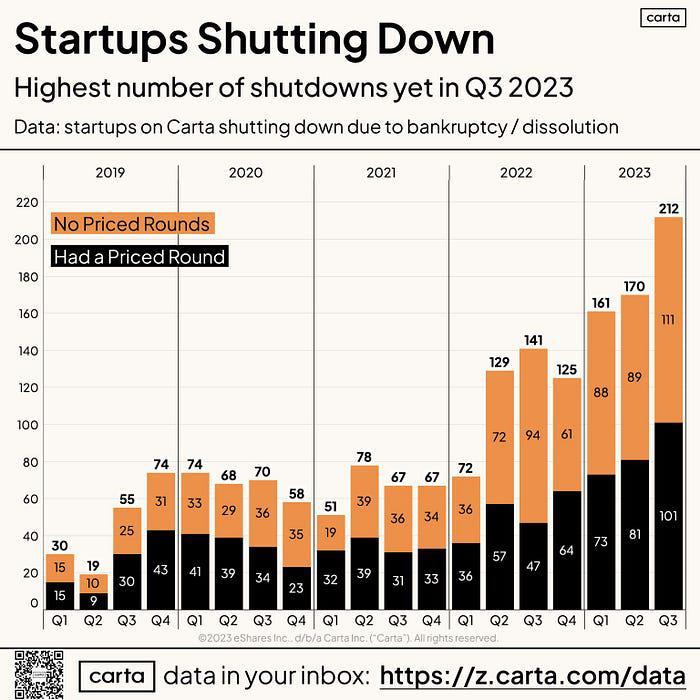
Capital is flowing out of the sector. I debated whether to put this in the freeze category or the flight category. Generally, nothing moves quickly in asset classes or sectors that are generally invalid, as venture capital and technology startups and investors tend to take a wait-and-see approach, so it can easily be frozen. However, ultimately, I landed on flight. Sadly, I think we may have seen a significant peak in LP investment in Australian venture for quite some time.
In 2023, Australia is on track to raise $42 billion less in technology startups than last year, with the number of deals being attacked down 42% year-on-year. This is a very normal rebound from the hubbub of the pandemic era of 2020/2021, and some might say it reflects the fact that companies need to focus on profitability or sustainability and do less growth. Let's face it, the fact that we have billions of dry powder in VC funds ($2.7 billion raised by Australian VC managers in 2022) suggests that it is trapped and going nowhere to play.
Australian super funds are consolidating. This means there is a larger capital pool to deploy, and many of them are making a fuss about increasing allocations to private equity and unlisted assets, but the increase in scale means they can invest in global assets. Essentially, they are moving to where they can get the best returns and now have the ability to write checks.
2019 was a critical moment for Australian VC. After various new funds emerged from 2013 to 2015 (including mine), some of them have now reached escape velocity scale and are providing returns realized from the first vintage. Fund managers can continue to gain support from super funds for subsequent vintages. As someone who managed $240 million across four funds in 2019 before these funds transitioned to new managers when the parent company joined management, I admit I couldn't help but see these. But for the sake of the industry, I must complete it. The fact that does not cause me sadness (not in a colloquial sense, but in a literal sense).
However, Australian VCs are undoubtedly panicking, and the potential for a long hold time until exits in 2023 may lead to a situation where the IPO market does not produce enough performance to provide a robust alternative to private capital, which could reduce returns across the board for VC funds. Unless we see another generation of companies like Canva emerge from that cohort. There may be some exceptions, but the likelihood of Australian VCs being anything other than zero means that by default, the technology sector will experience continued reductions or contractions in private investment capital for another five years or more.
Freeze
Layoffs - In 2022, we saw the technology sector sweep layoffs (also known as the "Tech Wreck"), but 2023 has worsened at least in the US. We have seen layoffs at US-based tech giants like Google, Microsoft, Meta, Amazon, and X (formerly Twitter). Recently, Spotify announced 1,500 job cuts in a third round of redundancies. In Australia, we have seen the same trend with companies like Atlassian and Microsoft Australia. Many are saying this is a sign that the hubbub of 2020/2021 is over... And that would be right - it is a classic freeze response - companies can survive by making their runway last longer. They are no longer pursuing growth. Perhaps, if they are standing still, they are pursuing a healthier growth trajectory and not running out of money to comply with the number one rule of startups.
We have not made real progress on female founders and diversity. Despite recent quarterly data from the cut showing a slight increase in funding for women, all-female teams currently capture only 5% of the total share of capital, and teams with at least one female founder ultimately raise less capital than all-male teams - this is still dismal. Let's see where the numbers for 2023 collapse overall, but my guess is that there is a "female penalty" where teams with at least one female co-founder raise less money (as we have seen in CTV data every year) due to the general misalignment of capital allocation with the representation in the ecosystem (the thesis that women or men, or people of specific races do not possess special entrepreneurial talents or merits should suggest that capital allocation should be assigned without bias, reflecting the general representation in the industry).
All-male teams attracted 67% to 93% of the data, but time and again, the data shows that mixed teams have produced better performance. And with significant attention being paid to improving diversity from groups like Blackbird, they are trying to optimize the top of the funnel and increase women's participation in the general tech workforce, so I looked at Blackbird's latest data (they should be commended for sharing) which shows that only 27.5% of companies that reached their investment committee had one female/non-binary founder, and the last 11 deals announced (in succession) were all male teams.
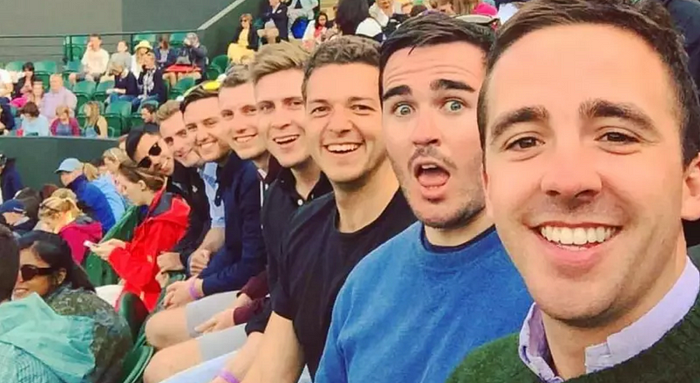
Even if you do not subscribe to the idea that "it is the right thing to do" to ensure that men and women have equal access to opportunities, you say you are a beast of capitalism, the data says that diverse teams perform better (I can link to research, but there is too much). In an era of globalization, if we do not fix this, the innovation and technology sector will struggle to compete globally and is already falling behind. Economically, I do not think it is dramatic to say that we really do not have backup for innovation (which itself is a backup to resources).
Fight
Artificial Intelligence - For those of us who are not even "tech optimists," it is hard not to see the emergence of AI as anything other than revolutionary, and 2023 was the year it entered general consciousness. We could see the beginning of its utility to the masses. Certainly, there are concerns. Certainly, there is still a hell of a lot to do, and OK, the pace of technological change is outpacing the ability of institutions to catch up in conversations about how to regulate it.
Details, details.
However, seeing such a truly innovative step change in technology, it is not hard to see the opportunity for a reinvention of the industry that Kara Swisher has called "life support for millennials." When laundry and delivery pick up or meals are delivered two minutes faster. The law of diminishing returns is well proven, and it has been hard to see where true productivity or investment returns come from (Narrator: the answer, dear reader, is always technology).
People in the deep tech sector have been looking to the power of AI and machine learning to solve very complex data solutions for a while, but now we can see how all generative AI is changing. In a similar way to how the internet transformed the way we did everything. The emergence of AI, particularly the emergence of OpenAI, has pushed back against the relevance of the high-tech industry (this is one of the greatest sports documentaries of all time and perhaps one of the best documentaries ever made).

Women are claiming their place in the high-tech industry and fighting for respect - against a backdrop of what seems to be a perennial conversation about the lack of diversity in the high-tech sector. Talk about experiences of sexism, gender discrimination, harassment, and abuse in Australia's tech sector. This has led to media coverage and the integration of several initiatives in development from individuals over the past few months. this, this, this, and this, and here and from here, from many others.
This is not a new or rare issue that women in the sector (or other sectors for that matter) have had to deal with. What is new is that we have seen the next generation of women cohorts in the sector. Sunlight is the best disinfectant, and I respect and admire these young women for stepping up - not just talking about it, but using their various influences and expertise to do something about it through their various initiatives. Stay tuned.

Honorable Mentions
The Emperor has no clothes. It is hard to summarize 2023 without talking about two of the biggest stories in technology this year. The open Elon Musk and the musical chairs of Twitter's board/CEO. I think both represent a new era in exposing the idol worship traps of the sector (money idol worship, entrepreneur idol worship, or high-tech company idol worship). These critical decisions that could affect us all in some way are often driven by demons that do not know what they are doing, rather than a higher purpose.
There are many examples to choose from when talking about Musk's absurdities and his steering of Twitter in 2023, but for efficiency, I think it is best to point out his recent interview with his "friend" Jonathon Ross Sorkin (known otherwise as "Andrew"). If you haven't already, I recommend watching the entire 90-minute interview. To describe it as awkward is probably the most charitable thing I can say. From Elon, who claims that customers do not want to spend advertising dollars on Twitter, "fear mail" (next time, be careful when you grow from LPS, it might be a little easy on my ego) if customers do not want to spend advertising dollars on Twitter (naturally, they do not want to place ads next to white supremacist accounts), who would they be? Earth 'decided to kill Twitter. It is hard to know whether this is a product of his views being gradually isolated in an echo chamber or a kind of self-indulgent tendency not to hold himself accountable for his actions. In the end, it really doesn't matter. This is an example of a very skilled person who can lead some game-changing companies (SpaceX, Tesla) yet bear the responsibility for one of the most epic commercial failures of one of the world's most beloved platforms (which may not have been without its failures) becoming completely irrelevant.
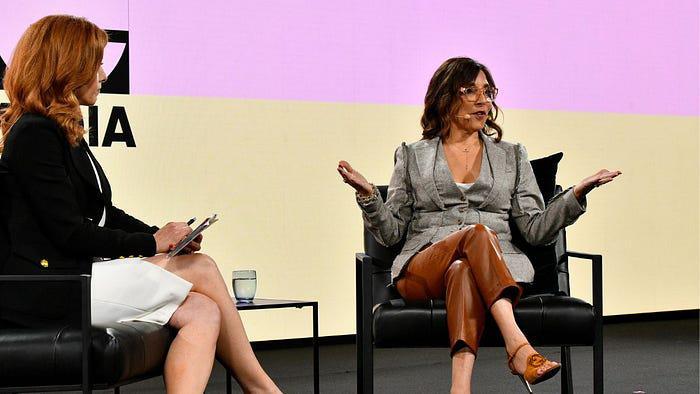
This year, the runner-up for "The Emperor has no clothes" Twitter files is his "CEO," Linda Yaccarino who did a truly terrible (horrible, awful, good, very bad, very bad) interview. If you want to witness a masterclass in how not to participate in a simple interview that asked all the questions a CEO worth their salt would expect, this is one. Not only did she not know her basic data about the platform, but she was evasive and combative, and I hope she is paid enough to do this gig to support her retirement because she will never be hired again after this performance.
Finally, the musical chairs at OpenAI is another example of the potential impact on humanity (representing the greatest potential threat to humanity since the atomic bomb) that is not only a positive signal but also not guaranteed, as its board, investors, and CEO come together. I wrote about it here, but to distill it, the message should be a warning that we place too much confidence in the abilities and motivations of the people responsible for these companies. At our peril, always driven by Trump's purpose.
Noteworthy positive developments in 2023:
Let's end on a positive note... the media's collective tumor will rejoice! This year, we have seen an explosion of excellent, educational, informative, and entertaining new media for the high-tech sector. Some of my favorites from domestic producers:
Capital Brief - Finally, there is a challenger media group dedicated to the business and finance sector. They do not seem to be obsessed with clicks, nor do they have Baity headlines. It is a pleasure to read. This does not mean they are never critical or focused on retaining explanatory power.
First Check - Hosted by Maxine Minter of Solo GP and Cheryl Mack, co-founder of Australian Angels, I love their really focused, almost academic approach to teasing out the thought processes investors have around risk, portfolio building, and strategy. For fund nerds like me out there, this is a must-listen.
Transparent VC by Tribe Global Ventures - As I said earlier, I have a bias, but I really think these folks have created something different. They mix founder interviews, investor interviews, and discussions about the news of the week to help you understand what it means to be an investor or founder, and they do it with humor and informality.
Advisory Board hosted by Megan Flamer and Alan Jones (The Good One - quietly, it is necessary to point out more than ever). Megan and Alan answer listener questions about the world of startups. It is useful and educational, but both have the most wonderful voices for audio format, so it is easy on the ears.
Thank you for reading this year. See you in 2024.
